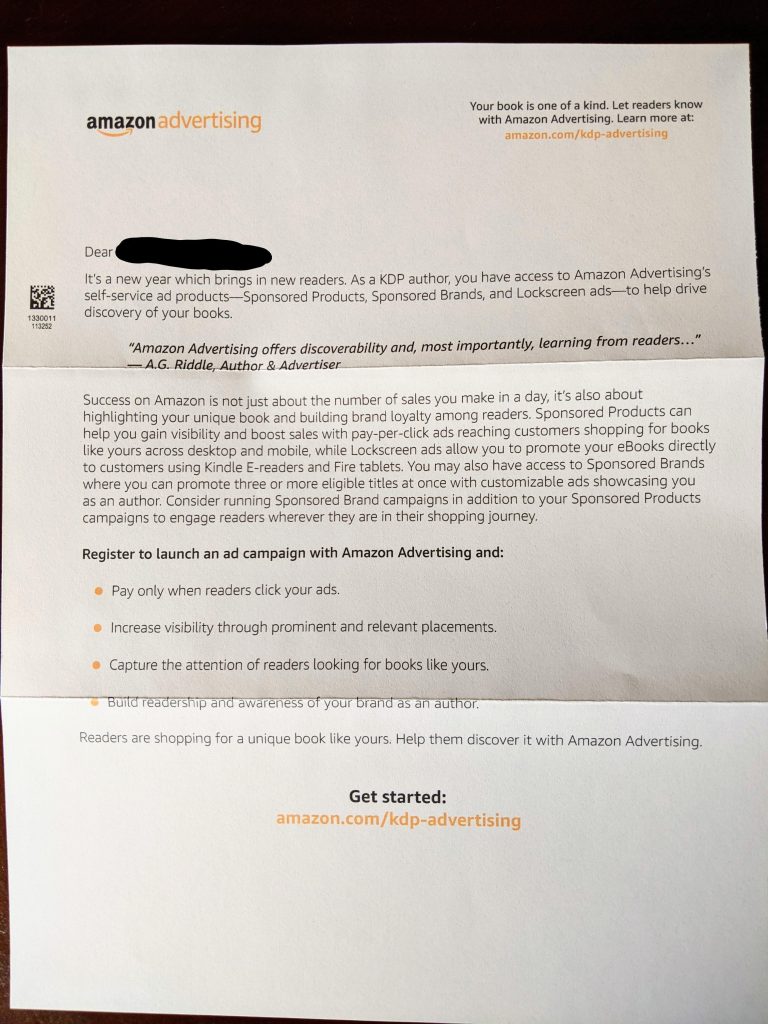Amazon ‘outing’ author pen names!
Many authors write under pen names to hide their true identities, and until now have done so under the perfectly reasonable assumption that Amazon would keep that identity secret. There are plenty of good reasons why an author would want to maintain their privacy, and no good reasons for Amazon (or any other publishing company) to put that privacy at risk.
Despite this, late last week a number of authors started reporting that Amazon Ads had sent physical letters to their homes, addressed to their secret pen names for anyone in the household picking up the mail to see. Whether this breach of confidentiality was willful or simply a mistake is irrelevant, and Amazon needs to take ownership of it. So far, however, it is looking more and more like they’re simply hoping everyone will just forget it ever happened.
Back before starting Hidden Gems I was a romance author, writing under a variety of pen names.
When I started, I was still working at a day job and writing part time. It was only after I had gained enough confidence in my earnings that I was willing to risk quitting that job to write full time, but I also knew that things could change and I might one day end up back there.
While I don’t live in an overly puritanical part of the world, nor did I think any of my coworkers would really hold it against me, I was still careful not to share my pen name with any of them. In fact, even now, eight years later, the number of people in my personal life that know the name I was writing under can be counted on one hand.
These days I keep that information private more out of habit than anything else–I have no intention of going back to my old job and don’t really care that much about being connected to those books, but my personal reasoning doesn’t matter anyway. It should be up to me to decide whether and with whom I share this information, not Amazon.
Yet late last week, Amazon took that choice away from many by sending out letters that not only breached the personal privacy of those authors, but have the potential to put the physical security of certain authors at risk as well.
What happened?
Last Tuesday, a reddit thread was started on the eroticauthors forum by a user with the handle CoconutCreamsicle, in which this author noted that Amazon Advertising had sent them a piece of physical mail to their home address. The problem was that both the envelope and the letter inside were addressed to their pen name instead of their real name!
This means that anyone living with that author, or with access to their mailbox, or just visiting at the wrong time could potentially learn a pen name that the author may be very intentionally trying to keep private.
This is a picture of the letter in question, supplied by and reprinted with permission from reddit user CoconutCreamsicle. Their pen name is blacked out.
It wasn’t long before many other users began chiming in about the seriousness of this issue, and soon others were reporting getting the same letter addressed to their own pen names. A new thread was started to capture and discuss this ongoing issue, with at least one user calling in to Amazon to complain. Based on the variety of responses they heard (based on multiple calls), it’s clear that Amazon reps were unprepared to handle this issue.
The first (and likely kneejerk) reaction from a rep was that the letter was fraudulent–a physical version of a spam message, sent by someone pretending to be Amazon.
Aside from this making no sense, since all the URLs on the page point to amazon.com and being a physical letter means they couldn’t even hide a malicious link behind those in some way, that argument would actually make the issue even more serious (if true). With Amazon being the company that houses an author’s real name, home address and pen name, the only way a third party scam artist could get that info would be if they had either hacked into Amazon’s database or compromised their security in some other way. If that was the case, Amazon has much bigger problems than just this.
Eventually, the response morphed into how they were investigating the issue but because it was security related they couldn’t give the author any further information.
I hope that they’re not arguing that because this is security related, they are absolved from ever providing any sort of justification, apology or answer about this issue. I can sort of see the logic behind not wanting to provide the specifics of what went wrong, but once they do figure it out, they absolutely should let the public know, or at least anyone affected by this.
So far, however, there have been no reports of Amazon contacting anyone about this to explain themselves.
Aside from the reddit threads, I did see the issue being discussed on at least one other author forum but there may be others. To be honest, I’m surprised more sites and forums aren’t talking about it, as while for some this may not be a big issue (or at most a minor inconvenience or embarrassment), for others it could have much more serious consequences.
Why is pen name privacy important?
Not all authors use pen names, and even among those that do, it may not be a piece of information that they keep secret from friends and family. Many authors are more than eager to tell anyone and everyone they know that they write and how to find their books–after all, that’s just a form of marketing, right?
Unfortunately, that’s not the case for everyone. Whether it’s because of the genre they write about, the topics they cover, their family or community morals or beliefs, or simply where they live in the world, staying anonymous when it comes to their writing is of vital importance to many authors. The consequences of having their privacy stripped away varies depending on the person and their situation, but can range from embarrassing to life threatening.
I mentioned my own personal reasons at the start of this blog, but another similar situation is that of frequent Hidden Gems contributor, Ginger.
To friends and family, Ginger is a mild-mannered British dude living in New York. Under his romance pen name, however, he’s written tawdry tales of debauchery and excess that make 50 Shades of Grey read more like the script of a Hallmark Original movie.
Yet years ago, Ginger was actually faced with the consequences of not keeping his pen name completely secret when a job he was in the running for fell through. The reason? The employer didn’t like that he wrote romance novels, as if there was something shameful about it.
The Top 100 ranks of Amazon’s erotica and romance categories are filled with books written by authors with curiously alliterative names that are almost all as fictional as the stories they write. This is because many authors fear that same sort of stigma, and thus don’t want their steamy books connected to their real-life identities. For Ginger, losing out on that job may have ended up being a blessing in disguise, considering the success he eventually found with his writing, but for many authors, losing a job could have far more devastating consequences on their lives.
As bad as losing a job is, the consequences of having a pen name “outed” could be far worse. Consider just a few other examples:
- An author that has concerns about readers/fans looking up their personal information in attempt to contact or meet them. When writing about anything controversial, this could be a very real concern regardless of where you live. But even aside from that, look at how much money big celebrities spend on personal security, just keeping away fans that love them. Most authors don’t make the kind of money they would need to hire security staff, but they still run the risk of having carried away fans looking them up.
- An author writing LGBTQ positive stories (whether they identify as LGBTQ or not) while living with family members or in a community that is homophobic or has strong religious or cultural beliefs that go against any sort of alternative lifestyles. Losing their anonymity could cause them to be kicked out of their house, or become an outcast of that community or their family.
- An author living in a country that has strict rules or laws against writing about certain topics or issues. If that author was writing about those things and relying on the anonymity of their pen name to keep them safe, being discovered could land them in jail or even worse.
You might think these cases are on the more extreme side, but that’s not to say that they don’t exist. They can and do exist in part because, until now, there have been very few ways someone could connect the dots between a pen name on Amazon and a real-life person living on their street.
If Amazon didn’t think authors should have any expectation of anonymity, then they shouldn’t provide a pen name field on their KDP form and instead force authors to enter their real names instead. By providing that field, though, it is entirely reasonable for authors to assume that their true identities will be kept private.
Sure, sending authors a letter addressed to their pen name doesn’t automatically mean that they will get discovered by anyone, or that if they do, any negative action will be taken against them. But it could. And it’s not up to Amazon to decide to gamble with an author’s anonymity for any reason, least of all to send them a marketing letter.
Why did only some authors get the letter? Are more coming?
There doesn’t seem to be any answer to why only some authors got this letter, although since it came from Amazon’s marketing and advertising arm, some speculate that it has something to do with that. Maybe you’re on one list but not the other, or that they were targeting only those that haven’t used the Amazon Ads service yet, etc.
Whether more letters like this are still coming is unknown. It’s likely this first batch of letters was already sent, and if Amazon discovered that they screwed up on the addresses maybe they will make sure to fix that in the future. Or maybe they won’t. Without hearing from them on the issue, it’s hard to even guess.
One thing you CAN do, however, is opt out of receiving physical mail via your Amazon marketing communication preferences. However, according to that same reddit thread, some of those that got the letters already had those preferences set to not send them mail. Still, it couldn’t hurt.
What happens next?
To be clear, while Amazon still hasn’t given any official explanation of what happened, my own personal belief is that this was just an accident. Like an old style mail merge, where they create a bunch of letters and envelopes personalized based on the info they have in their database. Only this time, someone accidentally pointed the “To” box to the pen name field instead of the real name field.
BUT that doesn’t excuse the fact that it DID happen, and that Amazon has so far taken no responsibility for the screw up.
I don’t know that they can fix what’s already been done. The letters were sent, people were outed or they weren’t, you can’t turn back the clock on that. What they could do, however, is at the very least admit the mistake, apologize, and outline the steps they’re taking to make sure it never happens again.
I don’t know whether they will do any of that, of course. Could be that simply admitting to something like that would open them up to potential lawsuits, although I imagine their army of lawyers and war-chest that rivals the GDP of many small countries would be effective at dealing with any of those, even if their EULAs and privacy policies don’t already have them completely covered.
Still, it seems pretty clear that they screwed up here and they should take ownership of it. And if they didn’t screw up, if this was intentional… well, I can’t imagine their reasoning on that, but if that WAS the case then I would have expected they would have clarified that by now. Especially considering that, from what I can tell, they’ve experienced very few ramifications.
When it started blowing up last week, I really expected it to become a much bigger deal. I don’t know if authors just didn’t hear about it, didn’t realize how serious it was, or simply didn’t care enough to make a big deal about it, but I wish they had.
In my opinion, any author that received a letter addressed to their pen name (whether it negatively impacted their lives or not) should absolutely contact Amazon and demand to know why their expectation of privacy was breached.
Not because they think Amazon will provide any compensation, or even because they just want to hear Amazon apologize for screwing up. It should be done so that Amazon realizes that this screw up was not acceptable. They need to understand that this sort of mistake isn’t just an inconvenience or embarrassment for authors, but could have very real and dire consequences, and as such, safeguards need to be put in place so that it doesn’t happen again.
The fact that this hasn’t gotten a lot of notice may mean that we got lucky this time, and none of these worst case scenarios came to pass. Could be that any authors in situations that could have imploded either weren’t sent the letter, or intercepted it before it could do any damage.
But if Amazon doesn’t take this issue seriously enough to make sure it never happens again, will we all be as lucky next time?












Fair enough to write under a pseudonym. However, we ALL have a right to know the real name of the pseudonym we are supporting.
Who, for example, is really ‘Ronni Salt’?
Readers have a right to know.
Thank you for sharing. I’m launching a new pen name, and although it’s in the category of “for marketing purposes” it should still be my choice as to when and/or if I reveal the connection
If we support you then we havr a right to know who you really are.
I think there is a whole lot of misinterpretation here and an overreaction somewhere along the line. Amazon sent mail to their “home” address. An address that authors provided to the vendor in which they are conducting business. This is not any different then getting any other kind of business mail at the address in which you provided.
Also, where are these authors having their paperback orders sent to? How is this any different?
I’m not sure we have all the facts to this story.
I think you’re missing the point here. The issue is not that the letters went to their home address. Yes, that was provided to Amazon. The issue is that the letters were addressed to the pen names, not the real names. They should ALWAYS be addressed to the real person, not to the fictional persona. All of the contact info on those pages for the authors that got those letters had their real names entered in along with their addresses. They did not have their pen names listed there. The only place that should have their pen names is KDP, yet somehow Amazon Advertising was able to access those pen names and use them to address letters instead of using the real names that should have been used. By doing this, they exposed the pen names to anyone that happened to see that unopened envelope.
It is a big deal. I would never order a stack of books under my pen name. I don’t even want the mailman knowing what my pen name is. There are reasons why I go through great lengths to hide my real name online and that includes stalkers, scammers, and crowds. Wait until your name is big enough to care and then you will care.
Fair enough. Agreed.
My point is that readers have the right to know who they are supporting.
If pen name Suzie Question is Sandra Kay then fine we’re reading and loving the work of Suzie Kay and supporting or batting for her (Sandra Kay).
That’s fair enough. We have a right to know who and what is behind the facade.